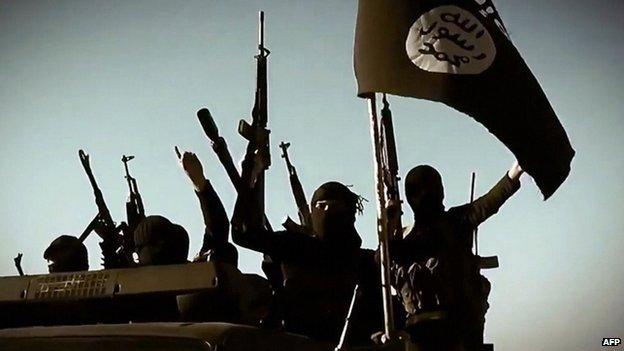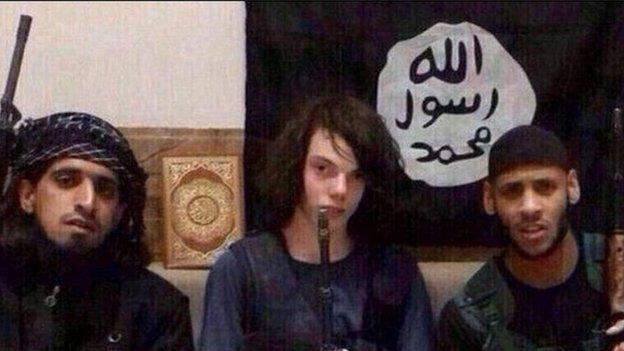Australians fighting with IS 'a serious security threat'
- Published

About 90 Australians are believed to have joined the ranks of IS in Syria and Iraq
Australians fighting alongside Islamic State (IS) militants in Syria and Iraq pose a "serious national security threat", according to a new report.
However, the Lowy Institute for International Policy report said the government's response could help lower the risk of an attack.
It suggested returning foreign fighters could be placed into deradicalisation programmes rather than jailed.
About 90 Australians are believed to have travelled to fight with IS.
Of those, at least 20 are reported to have been killed in the fighting.
On Tuesday, the father of a Melbourne man told broadcaster SBS, external he had been told his son had been killed in Syria. The Department of Foreign Affairs could not confirm the report.
Last September, the Australian government raised the national security level to "high", describing the threat posed by foreign fighters as its "number-one national security priority".
The report, external, written by Andrew Zammit, a researcher at Melbourne's Monash University, said the threat posed by returning fighters required a "wide-ranging counter-terrorist response that includes non-coercive measures".
He said Australia could learn lessons from European countries.

This image is believed to show Melbourne teenager Jake Bilardi, centre, who died in an IS suicide attack last month
"Returned foreign fighters have been involved in many of the most serious jihadist plots in the West, including in Australia. Returnees from Syria have already engaged in terrorist plots in Europe, and the large number of Australians involved with groups such as IS and Jabhat al-Nusra raises well-founded fears of an increased threat at home", the report said.
"Australia needs a wide range of tools to tackle the foreign fighter threat, not least because imprisonment, while often necessary, is not a cure-all. An imprisoned jihadist can radicalise other prisoners, inspire supporters outside, and may emerge from prison no less extreme or dangerous", it added.
However, Mr Zammit argues the threat "may turn out to be less than feared".
"A range of factors will determine the threat, including Australia's response. While much of the responsibility will lie with the police and intelligence services, CVE (Countering Violent Extremism) measures need to be a core element of the response, as they have been in the past.
"Australia can learn valuable lessons from European countries, which are already using CVE measures to address the issue of foreign fighters, although any Australian approach must be carefully calibrated for the local context."
Mr Zammit said the government's "troubled relations" with Muslim communities meant that its efforts to counter violent extremism were "not off to the strongest of starts".
In March, Australian teenager Jake Bilardi was believed to have died while carrying out a suicide attack in Iraq. His father, John Bilardi, said his son had been a "prize" for IS.